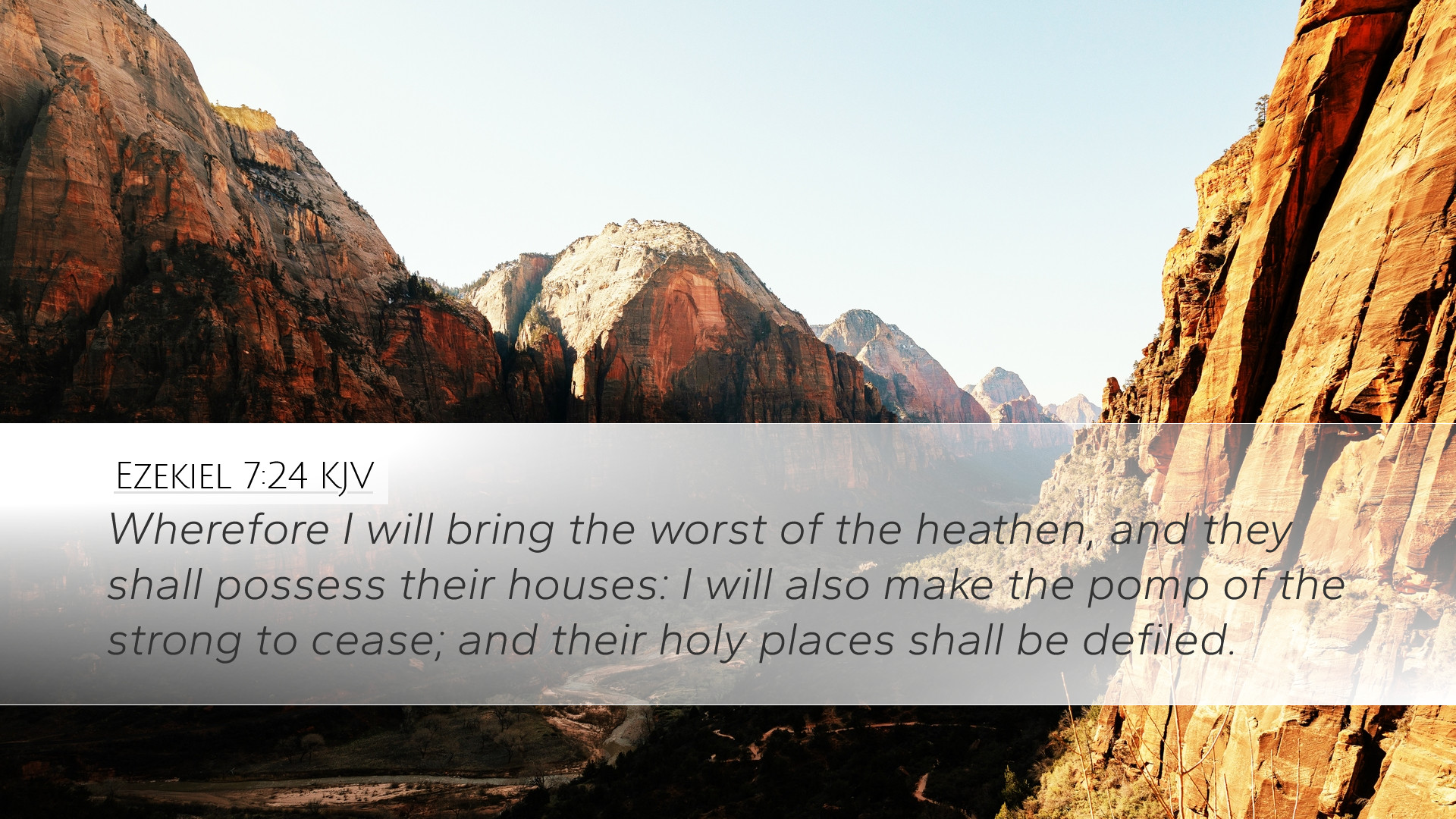Ezekiel 7:24 Commentary
Verse: "Wherefore I will bring the worst of the heathen, and they shall possess their houses: I will also make the pomp of the strong to cease; and their holy places shall be defiled."
Overview
The verse encapsulates a strong message from the prophet Ezekiel concerning impending judgment upon the people of Israel. The tone is somber and carries an implicit warning of the consequences of turning away from God and the subsequent invasion by foreign nations.
Contextual Significance
Ezekiel’s prophecies were directed to a people in exile, grappling with the loss of their homeland and the destruction of Jerusalem. This passage reflects the depth of their spiritual crisis and the divine response to their disobedience. The mention of "the worst of the heathen" signifies that the judgments are severe, underscoring the seriousness of God’s displeasure with His people.
Insights from Matthew Henry
Matthew Henry provides a detailed examination of the implications found in this verse. He emphasizes the focus on God's sovereignty, stating that He is the one who raises up oppressors as instruments of His judgment. According to Henry:
- Divine Retribution: The phrase "bring the worst of the heathen" indicates a divine act of retribution as a result of persistent disobedience.
- Possession of Houses: The invaders will not only conquer but will make the homes of the Israelites their own, symbolizing total loss and subjugation.
- Ceasing of Strength: The “pomp of the strong” refers to the pride and arrogance of those in power which will be humbled, showing that God will not allow the pride of man to stand before Him.
- Defilement of Holy Places: The defilement of holy places symbolizes a complete spiritual and communal breakdown. God is showing that His presence is withdrawn due to the sins of His people.
Insights from Albert Barnes
Albert Barnes expands on the themes of judgment and mercy in his commentary. He notes:
- The Agency of Foreign Nations: Barnes states that the involvement of “the worst of the heathen” emphasizes God’s control over historical events and nations. Even those who are outside the covenant community are used to fulfill divine purposes.
- Consequences of Corruption: The loss of homes and sanctuaries serves as a stark reminder of the consequences of corruption, both personal and societal, which sets a precedent for later generations concerning the importance of living righteously.
- Theological Reflection: Barnes invites readers to reflect on the nature of God’s judgment, which is not arbitrary but is based on moral decay leading to spiritual ruin. This serves as a historical warning applicable to all societies.
Insights from Adam Clarke
Adam Clarke’s commentary emphasizes the prophetic tone of urgency and the specific consequences awaiting the nation of Israel:
- Israel's Apostasy: Clarke argues that the text should be understood in light of Israel's feasts and forms of worship that have become corrupted, leading to God's judgment.
- Impending Invasion: His interpretation of "the worst of the heathen" suggests a particular focus on Babylon as an agent of divine wrath, demonstrating the centrality of Babylon in the narrative of judgment.
- Call to Repentance: Clarke points out the redemptive elements, calling the people to reflect on their actions and to seek God’s mercy in light of the prophecies of doom.
Theological Implications
This verse raises significant theological questions about divine justice, human sin, and the nature of prophetic warnings. The commentaries highlight that:
- God’s Sovereigny: God's sovereignty over nations and individuals is paramount. He is not distant during times of national distress but is actively involved in the tapestry of human history.
- Moral Responsibility: The passage suggests individual and corporate responsibility for sin, indicating that leaders and people alike are accountable for their actions and their rejections of divine covenant.
- Hope for Restoration: Despite the harsh realities of judgment, the overarching narrative of Ezekiel ultimately points to hope and restoration beyond judgment, a recurring theme of grace in the Scriptures.
Conclusion
Ezekiel 7:24 serves as a powerful reminder of the consequences of spiritual neglect and moral decay. The combined insights from Matthew Henry, Albert Barnes, and Adam Clarke emphasize the necessity of repentance, the sovereignty of God over judgment, and the hope for restoration in the face of divine discipline.
This verse calls pastors, students, theologians, and Bible scholars to a deeper understanding of God's character, His righteous judgment, and the ever-present opportunity for repentance and renewal in faith.


